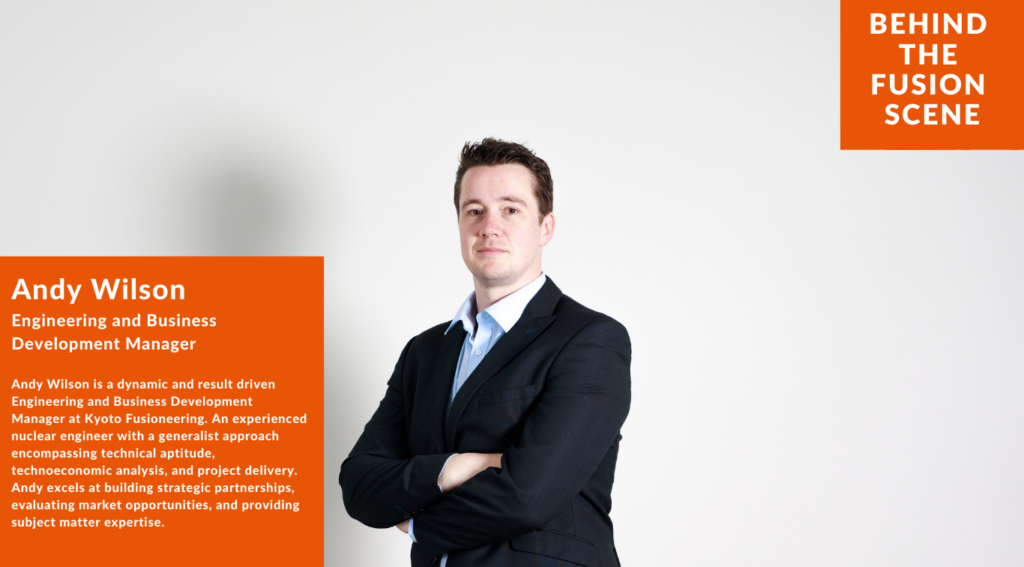
Andy Wilson, Engineering and Business Development Manager
Andy started his engineering career in offshore construction. He worked on large scale installation projects like wind farms and oil and gas platforms. He enjoys working on big engineering projects and building things. From a young age he was always fascinated by the physics of nuclear energy, particularly fission. Later Andy was given the opportunity to study nuclear engineering as a Masters and PhD, which gave him his first exposure to the fusion industry. Andy completed a Nuclear Engineering Masters at Imperial College London and went on to complete his PhD at The Open University. He actually studied under the same supervisor as one of the co-founders of KF, Richard Pearson.
His PhD initially looked at using high temperatures of Very High Temperature Reactors to produce hydrogen. Early on he realised that the output temperature of these fission reactors was not high enough to realistically produce H2 in this way, and pivoted the direction of his research. Andy instead looked at how nuclear fission power plants could deliver load following electricity into the grid. He did this by modelling a hybrid nuclear power plant and liquid air energy storage power plant. This involved both process engineering to determine the technical characteristics of the power plant designs and financial modelling to determine the plant’s economic viability in different market conditions. The novel output that his PhD research produced was a methodology for a market-led design approach to asymmetric energy storage systems.
When he finished his PhD Andy wanted to work in energy storage, so he joined the UK Department for Business, Energy & Industrial Strategy (BEIS) and worked on their Longer Duration Energy Storage funding programme as a programme manager. This gave him the opportunity to develop his project management skills and contribute subject matter expertise in energy storage. He later had the opportunity to join KF shortly after the UK subsidiary was established. This was a serendipitous opportunity; KF’s approach and ethos was exciting and largely aligned with his, and they had a gap that would utilise his skills.
What drew you to join KF and the fusion industry?
I have spent all of my professional career in the energy industry. I have a profound interest in bleeding edge technology, I relish working with complex problems with no immediately clear solution, and I want to contribute to the mission of making clean energy abundantly available. Nuclear energy was thus a natural progression for my career. When I completed my PhD, the fission industry was focused primarily on two things; the construction of light water reactors and the decommissioning of old power plants. Neither of these fulfilled my desire to be involved with novel technology, which in part helped my decision to join the Department for Business, Energy & Industrial Strategy (BEIS), working on energy storage projects.
Later, I had the opportunity to join KF and that was my first professional foray into the fusion industry. I was attracted to the industry, and KF in particular, because of the complex sets of challenges involved in fusion. Since I am more of an engineer than a scientist, and many fusion startups are focused primarily on the hard science problem of plasma development, I was better suited to KF’s activities, approach and ethos.
The other reason I was attracted to KF is that the company’s mission is not dependent on the success of a particular approach to fusion plasma; we are technologically agnostic. It doesn’t matter to us who builds the first plasma, or even the best plasma. The fact that KF was working on a range of technologies, with the vision of delivering fusion energy by helping all developers, really appealed to me. It is also a very clever business model for an industry that has a lot of uncertainties. From an organisational perspective, KF has the opportunity to work with a number of different developers, and therefore to engage with a number of different challenges specific to those developers. This variety keeps my job interesting and exciting.
What projects are you currently working on KF?
In my role, I often work on projects that see me interact with various functions across the organisation. I am currently managing KF’s parts of the Engineering Delivery Partnership framework with a consortium led by Atkins for UKAEA. More broadly, I am working on revamping KF’s approach to project delivery, ensuring that, as we make the transition from startup to a medium-sized enterprise, we are delivering high quality outputs in-line with client expectations. I continue to provide subject matter expertise where a project’s goals align with my own engineering experience and to develop ideas for new projects within KF and with our external partners.
What is KF doing to commercialise fusion and what is your role in the company in shaping that goal?
KF’s primary role in commercialising is developing the technologies that will turn fusion from a science experiment to an energy generation technology with the potential to change society and facilitate energy abundance. Energy production from plasma is the big first step, but turning that energy into a form that is useful to society is what the commercialisation of fusion will require. This is at the heart of KF’s mission.
My role in achieving this brings together business development, engineering and operational management. In terms of the business development side, this is about seeking ways to collaborate with research and development organisations that have technologies or ideas that are aligned with and can support our mission. This includes research centres and laboratories, universities, and industrial organisations all over the world.
In terms of engineering & operational management, I am responsible for ensuring that we deliver projects to a high level of quality for our customers and collaborators for them, in turn, to have a high level of confidence in the work we deliver. Ensuring that we have a pathway to developing experimental technology specific to partners needs into off-the-shelf products that can be utilised by a variety of customers inside and outside of the fusion industry is important to the large-scale rollout of these technologies, and is something that I am passionate about. KF is acutely focused on solving the challenge of serialisation and scale-up, which will be a major hurdle in the commercialisation of fusion. I also get opportunities to apply my subject matter expertise to a wide array of challenges, and am developing an approach to R & D investment risk analysis that will lean on my penchant for techno economic analysis.
How is the experience at KF helping you grow in skills & opportunities?
Working in a small but fast growing organisation is very exciting. It gives me exposure to different parts of the business that I would not have the opportunity to see working for a big corporation. Seeing the rapid growth of a small business in a high-tech sector has been a unique experience in my career.
There are also benefits that are unique to KF. The organisation has world class experts in fusion plant technology, plasma heating, and precision manufacturing – we require skills from different disciplines because the challenges within fusion energy that KF is tackling in its mission are complex and multifaceted, just like all of fusion! Being around these people gives me the opportunity to learn.
Your perspective for the future of fusion. What do you want to achieve in KF?
The biggest challenge to the commercialisation of fusion is that it will be a technology selling energy into a market that looks so different from that of today. Because of that, the form of energy that fusion energy is ultimately converted to is fundamental to its commercial success.
Fusion power plants cannot realistically expect to dominate the electricity market. As a result of that, the industry will need to look at other energy markets like industrial process heat, hydrogen production and carbon capture. Accessing these markets will require flexibility in the design of the fusion power plant and the development of technologies that will allow fusion energy to be converted into high temperature heat. This is a very difficult challenge, one that is being tackled by KF, which is developing high temperature blanket and energy conversion technologies. However, the challenge is critical, as fusion has a unique capability to deliver solutions in these markets, which makes it one of the most powerful tools we have for deep decarbonisation for humanity’s long-term future.
With my background, I have experience of market risk analysis for power plant designs. I intend to apply this unique knowledge and experience by developing a market-led optimisation approach that will reveal the investment risk benefits of ensuring that plant designs are sufficiently flexible to sell into a number of different markets and thereby to minimise their investment risk. I am currently exploring how to deploy my knowledge in this area to develop a modelling approach for this sort of analysis for KF.




